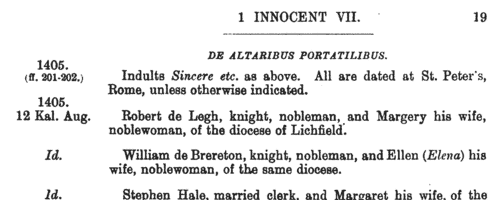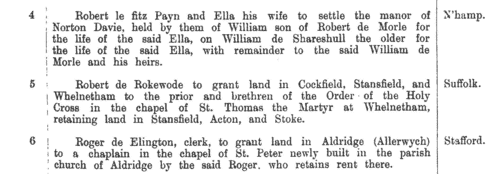Sevenoke Surname Ancestry ResultsOur indexes 1000-1999 include entries for the spelling 'sevenoke'. In the period you have requested, we have the following 10 records (displaying 1 to 10): Buy all | | | Get all 10 records to view, to save and print for £40.00 |
These sample scans are from the original record. You will get scans of the full pages or articles where the surname you searched for has been found. Your web browser may prevent the sample windows from opening; in this case please change your browser settings to allow pop-up windows from this site. Clerks and Clergy in Somerset
(1309-1329)
The register of bishop John de Drokenesford of Bath and Wells, edited by Bishop Hobhouse and published by the Somerset Record Society in 1887. It contains general diocesan business, mostly relating to clergy, but with some parochial affairs and disputes with names of parishioners. There are no ordination lists. The diocese of Bath and Wells at this period was almost exactly coextensive with the county of Somerset. SEVENOKE. Cost: £4.00.  | Sample scan, click to enlarge

| Clergy, the religious and the faithful in Britain and Ireland
(1342-1362)
These are abstracts of the entries relating to Great Britain and Ireland from the Regesta of popes Clement VI and Innocent VI, from the period when the papal court was resident at Avignon. Many of these entries relate to clerical appointments and disputes, but there are also indults to devout laymen and women for portable altars, remission of sins, &c. This source is particularly valuable for Ireland, for which many of the key government records of this period are lost. Clement VI was consecrated and crowned 19 May 1342 (the day from which his pontificate is dated); Innocent VI was crowned 18 December 1352 and died 12 September 1362. The extracts were made by W. H. Bliss and C. Johnson from Regesta cxxxvii to ccxliv, and published in 1897. The registers are almost complete for these two pontificates. At his accession, Clement VI promised to grant benefices to all poor clerks who should come to Avignon and claim them within two months of his coronation. As many as 100,000 are said to have come, and the register for the first year of his pontificate runs to twelve volumes.SEVENOKE. Cost: £4.00.  | Sample scan, click to enlarge

| Inhabitants of London
(1375-1399)
Letter Book H of the City of London contains enrolments of recognizances between inhabitants, particularly citizens, for sums of money lent or due; grants of pieces of land or property; and various records relating to the city administration.
SEVENOKE. Cost: £4.00.  | Sample scan, click to enlarge

| Indults for Portable Altars: London
(1404-1415)
Individuals (laymen, monks or priests) could obtain indults or indulgences from the Pope to possess portable altars, enabling them to do their devotions in unconsecrated places. The fee was 10 groats for one person, 12 for two (frequently a husband and wife). Lists of these indults, headed De Altaris Portatilibus, were entered in the Lateran Regesta in the Vatican archives; from the reigns of popes Innocent VII to John XXIII (1404 to 1415) there are such lists in volumes CXIX, CXXXI, CLIX to CLXI, CLXV, CLXVII and CLXXXIV, from the first year of Innocent VII, the second year of Gregory XII, and the second to fifth years of John XXIII. Those relating to the British Isles were copied and translated by J. A. Twemlow, and printed under the direction of the Master of the Rolls in 1904. SEVENOKE. Cost: £4.00.  | Sample scan, click to enlarge

| Grantees of offices, commissions and pardons
(1413-1416)
The Patent Rolls are the Chancery enrolments of royal letters patent. Those for the 1st, 2nd and 3rd years of the reign of king Henry V (21 March 1413 to 20 March 1416) were edited for the Public Record Office by R. C. Fowler, and published in 1910. The main contents are royal commissions and grants; ratifications of ecclesiastical estates; writs of aid to royal servants and purveyors; and pardons. The commissions of the peace issued for the English towns and counties and entered on the rolls, being largely repetitive, have been consolidated in a single appendix.SEVENOKE. Cost: £2.00.  | Sample scan, click to enlarge

| London and Middlesex Feet of Fines
(1198-1485)
Pedes Finium - law suits, or pretended suits, putting on record the ownership of land in London and Middlesex.SEVENOKE. Cost: £4.00.  | Sample scan, click to enlarge

| Landowners and tenants in London
(1345-1485)
Inquisitions ad quod damnum were held by the appropriate sheriff or escheator (or other officer in whose bailiwick the matter in question might lie) to investigate cases in which the royal or public interest might be damaged by proposed alienation or settlement of land (especially alienation to religious uses, into mortmain). The key findings from these inquisitions were as to the tenure of the land and the service due from it; its yearly value; the lands remaining to the grantor, and whether they sufficed to discharge all duties and customs due from him; and whether he can still be put upon juries, assizes and recognitions, so that the country be not burdened by his withdrawal from them. Generally speaking, this process had the makings of a system of licensing such alienations, and raising money in proportion to the valuations. Equally, there are many items that deal with subjects such as the closing of public roads, the felling or inclosing of woods, or the proposed grant of liberties or immunities. A calendar of these inquisitions from the 19th year of the reign of king Edward III to the 2nd year of Richard III was prepared by the Public Record Office and published in 1906. We have now indexed this calendar by surname and county. Most of the individuals appearing in the calendar are either pious individuals seeking to make grants to religious bodies for the sake of their souls; or landowners securing the disposition and settling of their real estate. But some other names do appear - tenants, trustees, chaplains and clerks.SEVENOKE. Cost: £6.00.  | Sample scan, click to enlarge

| Taxpayers in Sussex
(1524-1525)
By Act of Parliament of 1523 (14 & 15 Hen. III, c. 16) a general subsidy was raised, spread over four years, from laymen, clergy and peers. In each of the first two years 1s in the £ was raised from annual income from land; 1s in the £ on capital goods worth over £2 and under £20; and a flat payment of 4d on goods worth from £1 to £2, and also by persons aged 16 and upwards in receipt of £1 per annum in wages. In the third year a further shilling in the pound was payable on land worth £50 and upwards a year; and in the fourth year a shilling in the pound on goods worth £50 and upwards. To raise this revenue, returns were required from every hundred, parish or township. In Sussex, the returns for 1524 and 1525 cover the city of Chichester (divided into Estrata, Westrata, Southstrata, North[strata] and Palenta), the borough of Midhurst, and then the rest of the county divided into rapes, within those into hundreds, and within those into boroughs, tithings, liberties, townships or parishes. It is important to note that the cinque ports of Hastings, Rye and Winchelsea were exempt from the subsidy, except for alien inhabitants; and that the town of Westbourne was also exempted 'as the town was lately destroyed by fire'. Aliens are noted as such, sometimes with nationality; and Brighthelmstone (Brighton), which had been burnt by the French in 1514, is only represented fragmentarily. The Sussex Record Society published this transcript and edition by Julian Cornwall of the 1524 and 1525 returns: the 1524 return was used for the main transcript where possible, names peculiar to the 1524 lists being marked with an asterisk, and those with amendments in 1524 with a dagger. At the foot of each 1524 return the new names from 1525 are given. Only the amount of the assessment is printed (m. = marks). Letters prefixed to the sum give the basis of the assessment, no letter (or G) meaning that it was on goods - A, annual wages; D, annual wages of day-labourers; F, fees or salaries of office; L, lands; P, profits; W, wages; x, no basis stated. SEVENOKE. Cost: £4.00.  | Sample scan, click to enlarge

| Traders in Canterbury
(1392-1592)
No man or woman could trade in the city of Canterbury without having obtained 'freedom' of the city, unless they paid an annual fee to do so. Admissions of freemen were recorded on the Chamberlains' Accounts of the city, which were prepared annually from Lady Day (25 March) to Lady Day until 1752, and thereafter each set runs from 1 January to 31 December. The accounts for 1392 are incomplete, but thereafter until 1800 there is a complete series except for the years 1455 to 1457 and the year 1552-3. Joseph Meadows Cowper, Honorary Librarian to the Corporation, transcribed and privately printed in 1904 the lists of the Intrantes - those persons, not being free of the city, who paid the annual fine to trade - for the period 1392 to 1592. The names are arranged by ward (Burgate, Newyngate, Westgate, Worgate and Northgate, and give full name, (sometimes) occupation, and fee paid. SEVENOKE. Cost: £4.00.  | Sample scan, click to enlarge

| Testators and legatees in London
(1358-1688)
The Court of Husting of the city of London sat (usually on a Monday) each week: among its functions was the enrolment of deeds and wills relating to citizens of London. In their strictest technical sense the terms 'will' and 'devise' are appropriate to real estate, and the terms 'testament', 'bequest' and 'legacy' to personal estate, but this distinction is lost sight of in ordinary usage. This calendar of wills proved and enrolled in the Court of Husting was edited by Reginald R. Sharpe, records clerk in the office of the Town Clerk of the City of London, and printed by order of the corporation in 1890. The date of the court is given in italics, with the year in bold in the margin. The testator's name is given in capitals (surname first, in bold), and then a brief listing of substantial bequests, with the names of legatees, and then the date of making of the will, and reference. The bulk of the wills in this volume are from before 1600. SEVENOKE. Cost: £4.00.  | Sample scan, click to enlarge

|
Research your ancestry, family history, genealogy and one-name study by direct access to original records and archives indexed by surname.
|












